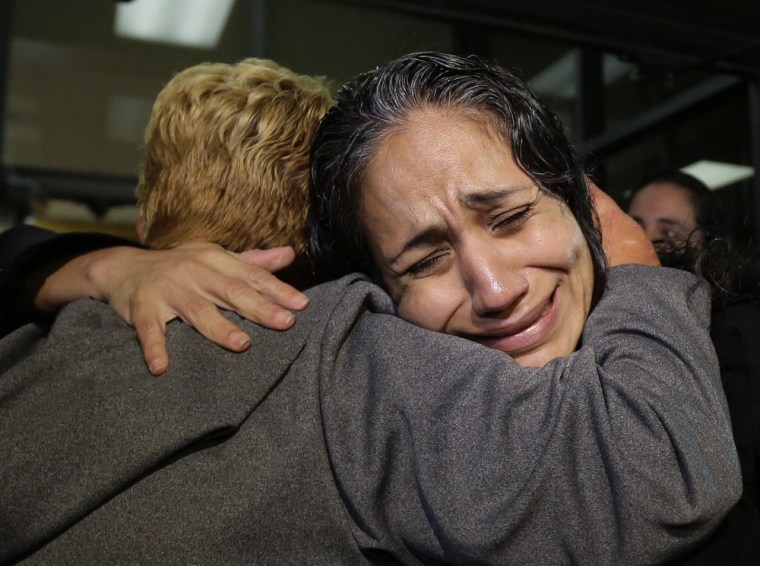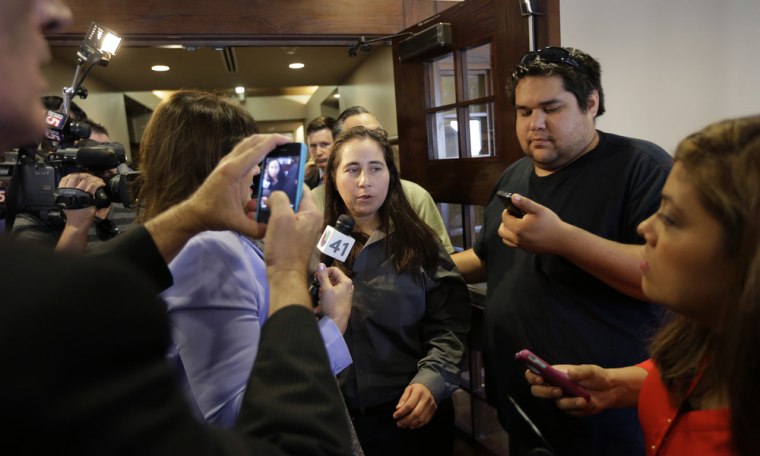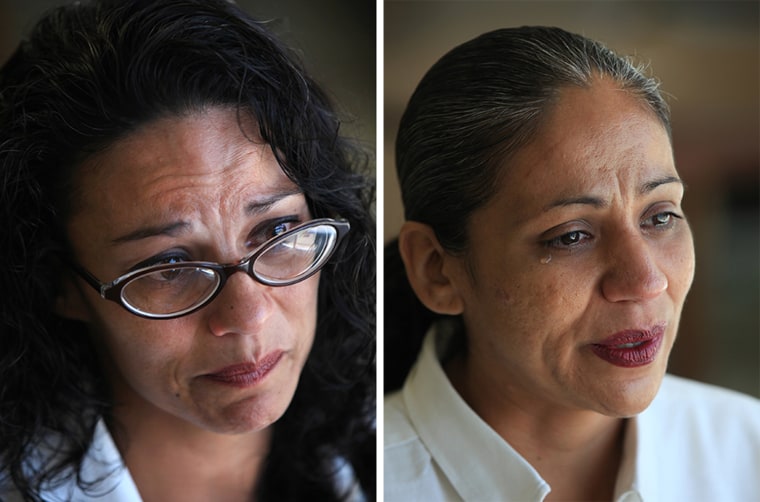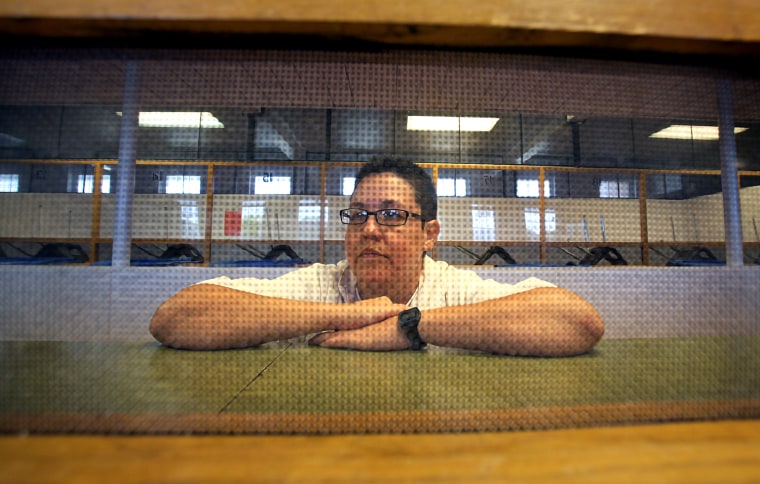
SAN ANTONIO, Texas -- Three women who served more than a decade in prison for allegedly molesting two girls were released on Monday after their lawyers and the district attorney agreed that recent scientific advances undermined medical testimony pivotal to their convictions, said their attorney Michael Ware.
Kristie Mayhugh, Cassandra Rivera and Elizabeth Ramirez were released on bond pending a decision by the Texas Court of Criminal Appeals on whether to grant them a new trial. If that happens, the Bexar County Criminal District Attorney's office will decline to prosecute them, and their convictions would be overturned, said Rico Valdez, chief assistant criminal attorney who oversees the office's post-conviction review.
A small crowd of supporters, family and friends cheered and clapped as the trio emerged from the county jail, holding their hands entwined and up in the air. Rivera embraced her brother Robert, told her granddaughter she had never seen, “I’m your grandma,” and to her son, Michael, who turns 22 on Tuesday, she said: “I made it in time for your birthday.”
Gloria Herrera, Ramirez's mother, was shaking and at a loss of words after her daughter Liz was freed after 17 years in prison. "Thank God for releasing the girls,” she said, noting of her embrace with her daughter, “It felt so good.”
A fourth woman convicted in the case, Anna Vasquez, was released on parole last year.
The new scientific advances were allowed to be presented on the women's behalf under a new "junk science" law passed in Texas earlier this year that gives defendants the chance to submit findings that may cast doubt on their conviction.

The evidence in question related to alleged signs of abuse on the older girl's hymen.
The women, known nationally as the "San Antonio 4," had always maintained their innocence and said the attacks never happened. At trial, child abuse expert Dr. Nancy Kellogg, who examined the girls, who were 7 and 9 at the time of the alleged assaults, said the older one had a scar on her hymen indicative of abuse that could have only occurred during the time the alleged assaults occurred.
A study published in 2007 by the American Academy of Pediatrics "concludes that torn or injured hymens do not leave scars as a matter of scientific fact," Ware said.
Though at the time, Kellogg provided a "medically appropriate diagnosis," the medical science "does not support that testimony anymore and she wouldn't testify that way today," Valdez said. "These women are entitled to a new trial because the medical science has changed, and we're going to do everything in our power to make sure that they are put in that position."

"In a crime where the defense was, 'It didn't happen at all,' the scar was probably the most important piece of evidence because it said it did happen," said Ware, a former member of the Dallas Conviction Integrity Unit collaborating with the Innocence Project of Texas on the case. "I don't think there was ever any skepticism," he said.
The girls accused Ramirez, their aunt, and her friends of attacking them twice in late July 1994 while they were visiting Ramirez at her apartment. The assaults allegedly involved the girls being held down, touched on their breasts, and having liquid and white powder put into their vaginas. The older girl claimed she had a gun held to her head and was told if she revealed the attacks to her dad and grandmother, with whom she lived, they would be killed.
Ware said the trial transcripts showed inconsistencies in the testimony given by the girls: what kind of weapon was used, when the attacks happened, who was there and who did what.
The younger girl has since recanted her story to the media, although not to the prosecutor's office, Valdez said. On Monday, the alleged younger victim, Stephanie Martinez, 26, said, “My aunt never hurt us. She was a mom to us," adding, “it didn’t happen.”
Martinez said she would help her aunt and her friends in their bid to get a full exoneration. “I want to apologize to them,” she said, breaking down into tears. “I’m sorry for everything.”
Her older sister still maintains that the alleged assaults took place.
Although Ware said the women’s strongest ground for relief was the junk science claim, he also argued -- in the writ of habeas corpus that he filed for each woman – that their right to due process was violated by “materially inaccurate” and “highly prejudicial” testimony provided by Kellogg, as well as by the “false trial testimony” given by the two girls.

The women, all lesbians, were fighting sexual assault charges at a time when the alleged day care abuse cases of the late 1980s and early 1990s were still fresh in public memory. In those cases, alleged attackers were accused of abusing children during Satanic rituals. Suggestions of a possible Satanic link were also present in the proceedings against the San Antonio 4, said Debbie Nathan, author of a book on the topic and a board member of the National Center for Reason and Justice, a watchdog group dedicated to identifying false allegations of harm to children.
Nathan said the allegations leveled against the women -- the group abuse, the gun, the injection of liquid into the girls' vaginas, and a lot of screaming during the attacks -- were hallmarks of the day care cases.
"I call this the last gasp of the ritual abuse panic," she said. Nathan’s group was the first to bring public attention to the case, which languished as the women penned letter after letter to organizations seeking help.
For the San Antonio 4, their journey doesn't end here. They are pursuing full exoneration to clear their names.
"This is just a hurdle that we're crossing. It's not over, it's not near being over. This is a step forward to exoneration," Vasquez said late Sunday. "We've always maintained our innocence, we've never taken the easy road out."